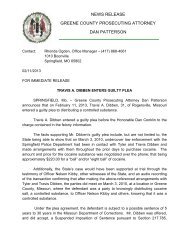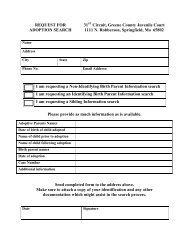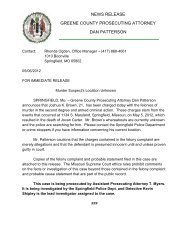Road to Reunification Powerpoint - Greene County, Missouri
Road to Reunification Powerpoint - Greene County, Missouri
Road to Reunification Powerpoint - Greene County, Missouri
Create successful ePaper yourself
Turn your PDF publications into a flip-book with our unique Google optimized e-Paper software.
ROAD<br />
TO<br />
REUNIFICATION<br />
Abuse & Neglect Unit<br />
<strong>Greene</strong> <strong>County</strong> Family Court<br />
Juvenile Office<br />
greenecountymo.org/juvenile
COURSE AGENDA<br />
• FAMILY COURT PROCESS<br />
• ROLES & RESPONSIBILITIES<br />
• FAMILY SUPPORT TEAM MEETING<br />
• TREATMENT PLANS<br />
• PARENT & CHILD – VISITATION &<br />
INTERACTION
Family Court Process<br />
• Protective Cus<strong>to</strong>dy Hearing<br />
(within 3 days)<br />
• Jurisdictional/Dispositional Hearing<br />
(within 60 days)<br />
• Dispositional Review Hearing<br />
(every 90-120 days until Permanency)<br />
• Permanency Hearing<br />
(12 months from Protective Cus<strong>to</strong>dy Hearing)
Protective Cus<strong>to</strong>dy Taken<br />
Petition Filed<br />
REUNIFICATION FLOWCHART<br />
Protective Cus<strong>to</strong>dy<br />
Hearing (PCH) – (72 hours)<br />
72 hour FST meeting<br />
Jurisdictional/Dispositional<br />
(60 days from PCH)<br />
Dispositional Review<br />
(every 90-120 days)<br />
30 day FST meeting<br />
60 day FST meeting<br />
90 day FST meeting<br />
Permanency<br />
(12 months from PCH)<br />
120 day FST meeting
Family Support Team<br />
A team that ensures that the necessary services<br />
and support are provided <strong>to</strong> all parties of the<br />
case.<br />
The team would include the Parent, Case<br />
Worker, Court Appointed Special Advocate,<br />
Guardian Ad Litem, Parent’s At<strong>to</strong>rney, Deputy<br />
Juvenile Officer, and any other individuals<br />
working <strong>to</strong>ward the goal of reunifying the child<br />
back in<strong>to</strong> the parental home.
Judge<br />
Therapist<br />
DJO<br />
Family<br />
Support<br />
Foster<br />
Parent<br />
Parent<br />
&<br />
Child<br />
CASA<br />
CW<br />
At<strong>to</strong>rney<br />
for<br />
Parent<br />
GAL
ROLES & RESPONSIBILITIES<br />
• PARENTS<br />
• JUDGE – Fact finder/decision maker.<br />
• DJO – Court Case Manager<br />
• CD – Investigative worker<br />
• CW – Agency Case Worker<br />
• CASA – Court Appointed Special Advocate<br />
• GAL – Legal Representative for child<br />
• PARENT’S ATTORNEY<br />
• FOSTER PARENTS
PARENTS<br />
Roles/Responsibilities<br />
• Visit and provide emotional support for<br />
your child.<br />
• Provide financial support for your child.<br />
• Stay in <strong>to</strong>uch with your team members.<br />
• Attend Family Support Team meetings<br />
and court hearings.<br />
• Complete treatment plan
JUDGE<br />
Roles/Responsibilities<br />
• Hears evidence regarding your case.<br />
• Determines what is in your child’s best interest.<br />
• Ensures that the case is progressing in a timely<br />
manner.<br />
• Makes decisions about your case.
DEPUTY JUVENILE OFFICER<br />
Roles/Responsibilities<br />
• Assists in investigations.<br />
• Make sure that court orders are followed.<br />
• Attend Family Support Team meetings and court<br />
hearings.<br />
• Provide information and recommendations <strong>to</strong> the<br />
Judge at hearings.
CHILDREN’S DIVISION -<br />
INVESTIGATOR<br />
Roles/Responsibilities<br />
• Receives hotline report.<br />
• Investigates the concerns from the hotline.<br />
• Provides a written report regarding the<br />
hotline.
CASE WORKER – ALTERNATIVE CARE<br />
CD, BGTM, MBCH, PRESBY, SP PART<br />
Roles/Responsibilities<br />
• Provides written reports for the Judge <strong>to</strong><br />
review.<br />
• Schedules Family Support Team<br />
meetings.<br />
• Moni<strong>to</strong>rs child and their placement.<br />
• Makes treatment referrals for the entire<br />
family.<br />
• Conducts home visits.<br />
• Arranges visitation for the family.
CASA – Court Appointed Special Advocate<br />
Roles/Responsibilities<br />
• A volunteer for your child.<br />
• Visits with child.<br />
• Talks <strong>to</strong> family members and other people<br />
involved with your child.<br />
• Prepares reports for the Judge <strong>to</strong> review.<br />
• Attends Family Support Team meetings<br />
and court hearings.
GAL – Guardian Ad Litem<br />
Roles/Responsibilities<br />
• Your child’s legal representative.<br />
• Represents your child’s interests in court.<br />
• Speaks with your child if age appropriate.<br />
• Attends Family Support Team meetings<br />
and court hearings.
PARENT’S ATTORNEY<br />
Roles/Responsibilities<br />
• Legal representative for parent.<br />
• Informs parent about case.<br />
• Presents parent’s case <strong>to</strong> the Judge.<br />
• Provides information as <strong>to</strong> how the parent will<br />
reunify with their child.<br />
• Attend Family Support Team meetings and<br />
court hearings.
FOSTER PARENTS<br />
Roles/Responsibilities<br />
• Provide a temporary family setting for your child.<br />
• Make child available for and be supportive of<br />
family visits.<br />
• Take child <strong>to</strong> school, doc<strong>to</strong>r and dentist.<br />
• Attend and participate in Family Support Team<br />
meetings and court hearings.<br />
• Act as a men<strong>to</strong>r <strong>to</strong> the parent when appropriate.<br />
• Keep a life-book for your child.
What is a FST Meeting?<br />
(Family Support Team Meeting)<br />
• An opportunity for the Family Support Team <strong>to</strong><br />
meet <strong>to</strong>gether <strong>to</strong> discuss what has been<br />
happening on the case and what needs <strong>to</strong><br />
happen.<br />
• An opportunity for each Family Support Team<br />
member, including yourself, <strong>to</strong> provide<br />
information and ask questions.<br />
• An opportunity <strong>to</strong> discuss and make decisions<br />
regarding visits.<br />
• Your child may attend if appropriate.
What is a TREATMENT PLAN?<br />
• It is your family plan for change.<br />
• It contains your responsibilities.<br />
• It contains the responsibilities of your case<br />
worker.<br />
• It is developed by you and your support team.<br />
• It is ordered by the Judge.<br />
• A plan for reunification.
Treatment Plan<br />
Common requirements on treatment plan<br />
• Visit and provide emotional support for your<br />
child.<br />
• Provide financial support for your child.<br />
• Provide a safe home for you and your child.<br />
• Maintain stable employment or have a legal<br />
source of income.<br />
• Complete psychological evaluation.<br />
• Complete parenting classes.
Treatment Plan<br />
Common requirements on treatment plan –<br />
• Complete drug and alcohol assessment<br />
and Treatment as recommended.<br />
• Complete all requested drug screens.<br />
• Attend and participate in individual and<br />
family counseling.<br />
• Sign releases of information.<br />
• Stay in contact with your case worker and<br />
the Family Support Team.
How <strong>to</strong> successfully have your child<br />
reunited with you.<br />
• Be honest and responsible.<br />
• Complete tasks from Treatment Plan.<br />
• Follow the recommendations of the service<br />
providers.<br />
• Demonstrate, by your actions, changes of<br />
behaviors and attitudes.<br />
• Provide proof of your accomplishments.
PARENT & CHILD – VISITATION &<br />
INTERACTION<br />
• Why visits are important.<br />
• Resources <strong>to</strong> strengthen<br />
visitation and interaction.
IMPORTANCE OF VISITS<br />
Togetherness<br />
“Connection”<br />
• Your child loves you and needs <strong>to</strong> see<br />
you.<br />
• Visits need <strong>to</strong> be consistent and happen<br />
every time they are scheduled.<br />
• Visits need <strong>to</strong> be about you and your<br />
child being <strong>to</strong>gether.<br />
• This is not a time <strong>to</strong> talk about the<br />
case with your child or the<br />
Caseworker.
IMPORTANCE OF VISITS<br />
“Connection”<br />
Togetherness for others<br />
• Visits are first about you and your<br />
child spending time <strong>to</strong>gether.<br />
• You will need <strong>to</strong> talk with your<br />
Caseworker and the Family<br />
Support Team if you want others,<br />
like relatives or step-parents, <strong>to</strong><br />
visit with your child.<br />
• Background checks may be<br />
requested on anyone visiting your<br />
child.
IMPORTANCE OF VISITS<br />
“Preparedness”<br />
Bring activities for you and your<br />
child <strong>to</strong> do during the visit.<br />
• Keep a visit bag ready.<br />
• Books, familiar <strong>to</strong>ys, games,<br />
Crayons/markers/pencils, paper,<br />
coloring/activity books, activity items,<br />
and snacks.<br />
• Bring some of the same things each<br />
time for consistency.<br />
• Bring something different each time<br />
for excitement.
IMPORTANCE OF VISITS<br />
“Preparedness”<br />
Visit snacks<br />
• You do not have <strong>to</strong> bring a snack.<br />
• If you choose <strong>to</strong> bring a snack it<br />
should be small.<br />
• Try <strong>to</strong> bring snacks that are<br />
healthy.<br />
• If the visit includes a meal time<br />
consider bringing a packed lunch<br />
from home.<br />
• Bring wipes <strong>to</strong> help clean up after<br />
your child has eaten.
IMPORTANCE OF VISITS<br />
“Interaction”<br />
Be sensitive, understanding and<br />
accepting of your child's actions<br />
and words.<br />
• Children may call other caregivers<br />
“mom” or “dad”. Trust that they<br />
still know that you are “their”<br />
mom/dad.<br />
Pay attention show interest and<br />
join in your child’s activity.<br />
Encourage and compliment your<br />
child.
IMPORTANCE OF VISITS<br />
“Nearness”<br />
Interact with your child.<br />
• Be gentle and loving.<br />
• Give hugs and kisses.<br />
• Make eye contact with your child.<br />
Be near your child.<br />
• Sit on the floor if your child is<br />
playing on the floor.
IMPORTANCE OF VISITS<br />
“Emotions”<br />
Watch for, respond <strong>to</strong> and<br />
support your child’s feelings.<br />
• Comfort your child if they are sad<br />
or hurt.<br />
• Be excited if your child is happy.<br />
Encourage positive emotions.<br />
• Smile<br />
Keep your emotions calm<br />
through the end of the visit.
IMPORTANCE OF VISITS<br />
“Exploration”<br />
Offer choices, but follow your<br />
child’s lead <strong>to</strong> choose the activity<br />
and how long the activity will last.<br />
Adjust activities <strong>to</strong> match your<br />
child’s interest and ability.<br />
Offer slight challenges <strong>to</strong> promote<br />
your child’s learning and development<br />
of new abilities.<br />
Let your child try <strong>to</strong> problem solve<br />
(do it on their own).<br />
• Offer help if needed.
IMPORTANCE OF VISITS<br />
“Communication”<br />
Ask open ended questions.<br />
• Not yes/no questions<br />
Talk with your child about what they<br />
are and have been doing.<br />
Model taking turns when talking with<br />
your child.<br />
Listen and respond <strong>to</strong> what your child<br />
is saying.<br />
Talk with your child about family<br />
members and about recent things<br />
they have been doing.
IMPORTANCE OF VISITS<br />
“Limits”<br />
Don’t be afraid <strong>to</strong> be the parent.<br />
Give your child positive directions.<br />
Set appropriate limits and<br />
consequences.<br />
Be firm and clear and follow through.<br />
Use distraction, redirection, choices<br />
or reasoning <strong>to</strong> help your child learn<br />
appropriate behaviors.
IMPORTANCE OF VISITS<br />
Transition talk.<br />
“End of Visit”<br />
• Let your child know the visit will<br />
end soon and plan the next visit.<br />
Have a clean-up routine.<br />
Don’t make promises.<br />
Leaving an object.<br />
• Let your child take with them a<br />
drawing that you did <strong>to</strong>gether.
IMPORTANCE OF VISITS<br />
Saying good-bye.<br />
“End of Visit”<br />
• Keep the good-bye short.<br />
• Reassure your child that you love<br />
them you will see them at the<br />
next visit.<br />
• Keep your emotions calm.<br />
• Give your child permission <strong>to</strong> leave<br />
with the foster parent.
Resources <strong>to</strong> strengthen<br />
visitation and interaction<br />
Parenting Classes<br />
• Help you <strong>to</strong> understand developmental<br />
needs and skills of your child.<br />
• Help strengthen bonding and attachment<br />
with your child.<br />
• Help strengthen communication with your<br />
child.<br />
• Help make visits more enjoyable.<br />
• Help you build on your parenting skills <strong>to</strong><br />
be more aware, confident and purposeful<br />
in your parenting.
Resources <strong>to</strong> strengthen<br />
visitation and interaction<br />
Counseling Services<br />
• Healthy way <strong>to</strong> address past issues and<br />
reflect on your parenting.<br />
• Healthy way <strong>to</strong> work through family<br />
issues.<br />
• Help <strong>to</strong> understand how your past affects<br />
your parenting and your child’s future.<br />
• Help <strong>to</strong> recognize unhealthy patterns and<br />
behaviors and how <strong>to</strong> choose more healthy<br />
ones.<br />
• Therapeutic visits may be set up for<br />
some cases.
Resources <strong>to</strong> strengthen<br />
visitation and interaction<br />
Visit Supervisor<br />
• The best source for telling others<br />
on the team how well you are<br />
interacting with your child.<br />
• They are there <strong>to</strong> help you during<br />
your visit with your child.<br />
• Don’t be afraid <strong>to</strong> ask them for<br />
suggestions.
Parent Aide<br />
Resources <strong>to</strong> strengthen<br />
visitation and interaction<br />
• Are assigned on some cases.<br />
• A more personalized Visit<br />
Supervisor.<br />
• May arrange visits outside of the<br />
agency visiting room.<br />
• Also meet with parent individually<br />
<strong>to</strong> talk about the parents<br />
progress.<br />
• Help the parent plans visitation<br />
activities.
Resources <strong>to</strong> strengthen<br />
visitation and interaction<br />
Foster Parent<br />
• Can be a source of information<br />
exchange for you as a parent.<br />
• Can become a men<strong>to</strong>r for you as a<br />
parent.
This is YOUR case.<br />
Take OWNERSHIP over it.<br />
• The Goal for the case is <strong>Reunification</strong>.<br />
• The Team wants you <strong>to</strong> succeed.<br />
• Show everyone that you have learned and<br />
made changes by your actions and<br />
behaviors.
THE ROAD<br />
TO REUNIFICATION<br />
QUESTIONS?
















